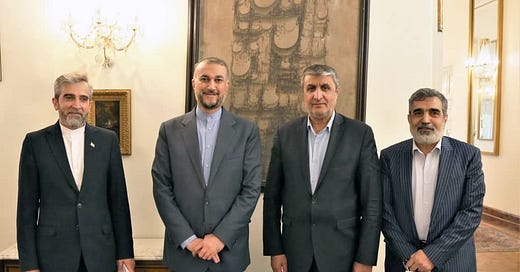US, Europeans refute Iran claims on new proposal but say deal at hand if Iran wants it
If the Iranians “want a deal, it’s at hand, and they know what to do,” senior American diplomat.

“If [the Iranians] want a deal, it’s at hand, and they know what to do,” senior American diplomat
Iran messages earlier this month were “pure theatrics: a last-minute attempt to forestall a resolution in exchange for meetings that the EU had been asking for for weeks,” US diplomat.
The Iranians “made a rather vague proposal before the Board meeting,” European diplomat.
“The problem is that everything is stuck since a while, and [things are] now more confrontational after” IAEA board meeting, European diplomat.
Iranian officials in recent days have suggested that they conveyed substantive “new initiatives” to the US and western powers ahead of a UN atomic agency board meeting this month. But US and European officials have characterized the Iranian messages as vague and offering possible meetings, but not substantive proposals about how to close remaining gaps on a deal to revive the 2015 Iran nuclear pact.
Iran has turned off some IAEA cameras and moved to use cascades of advanced IR-6 centrifuges for enrichment in the wake of the International Atomic Energy Agency (IAEA) Board of Governors (BoG) on June 8 passing a resolution urging Iran’s cooperation with an agency probe.
“We offered our proposal including a timeline and a roadmap to the other party (the US) before the IAEA Board of Governors session, and for the first time, it was transferred via two foreign ministers,” Iran foreign ministry spokesman Saeed Khatibzadeh told journalists at his weekly briefing Monday (June 20), Iranian journalist Abas Aslani reported.
The Iranian proposal was transferred via European Union foreign policy chief Joseph Borrell and two other foreign ministers, Khatibzadeh also said, according to Iranian media reports.
“In an [indirect] exchange of messages with the US, we’ve offered new initiatives in the past two days to open the path,” Iranian Foreign Minister Hossein Amir-Abdollahian said on June 8, Aslani reported.
But a European diplomat that day characterized the Iranian message as containing “nothing on substance.” It was “just about meetings in case the resolution was withdrawn.”
A senior American diplomat today (June 20) similarly characterized the Iranian messaging ahead of the IAEA board meeting as “pure theatrics.”
“I suspect you know their agitation pre-[Board of Governors meeting] was pure theatrics: a last-minute attempt to forestall a resolution in exchange for meetings that the EU had been asking for for weeks but without any substance behind them,” the senior US diplomat told me.
“Those meetings could have been held weeks ago if Iran was genuine about wanting to close,” the U.S. official continued. “We were prepared to agree to these (indirect) meetings if we had some sense of their parameters. We didn’t.”
“I don’t know if they are serious now,” the US official continued. “I’m not sure they themselves know.”
“If they want a deal, it’s at hand, and they know what to do,” the American diplomat said.
Photographs show that Iran’s Foreign Minister Amir-Abdollahian hosted a meeting today with the head of the Atomic Energy Agency of Iran (AEOI) Mohamed Eslami, AEOI spokesman Behrouz Kamalvandi, and lead Iranian nuclear negotiator and deputy foreign minister, Ali Bagheri-Kani.
Shortly after photos of the unusual meeting were circulated by Iranian media, Reuters reported that Iran had informed the IAEA that it had begun a pre-enrichment process using a cascade of advanced IR-6 centrifuges at the underground Fordow enrichment facility, but not informed the agency of what level of enrichment it was preparing to undertake.
“Tehran had not clarified which level the cascade would enrich to, which the IAEA confirmed in a statement,” the Reuters report said.
Meantime, the European diplomat characterized as “largely correct” a June 19 report in Middle East Eye suggesting that Iran had at some point proposed an alternative to its request for delisting the Islamic Revolutionary Guards Corps (IRGC) from a State Department terror black list. But the European diplomat seemed to suggest that the Iranian proposal described in the piece, for the U.S. delisting of another IRGC-linked entity from a Treasury list, had been conveyed at some earlier point in the negotiations, not so recently.
“A source told Middle East Eye that Iran, in a new proposal, has dropped its IRGC demand, but has called for lifting of sanctions imposed by the US against Khatam-al Anbiya Construction Headquarters, an economic arm of the IRGC, and a few other entities,” a Tehran-based correspondent reported at Middle East Eye June 19.
“It is largely correct but not new,” the European diplomat said. “The problem is that everything is stuck since a while, and [things are] now more confrontational after the IAEA Board” meeting.
“They made a rather vague proposal before the Board meeting,” the European official said.
Is there a possibility that the Iranians intended their proposal to be serious but they are just diplomatically clumsy, I asked the US diplomat.
“They knew what they were doing, and knew it was empty, since we made clear that if it was substantive, we’d go for it,” the US diplomat said.
**


